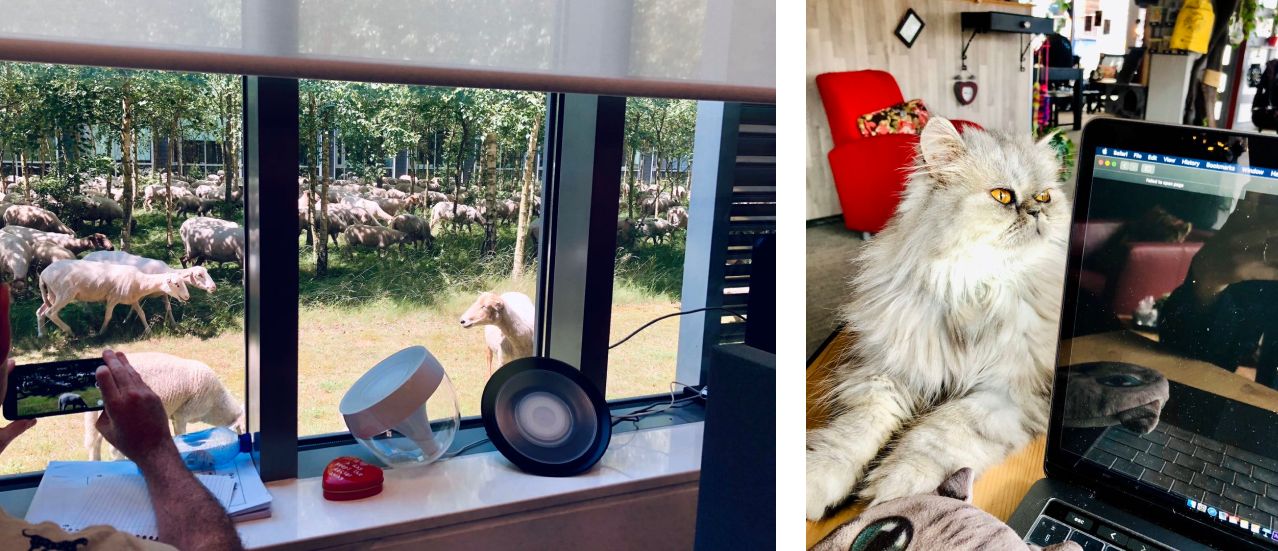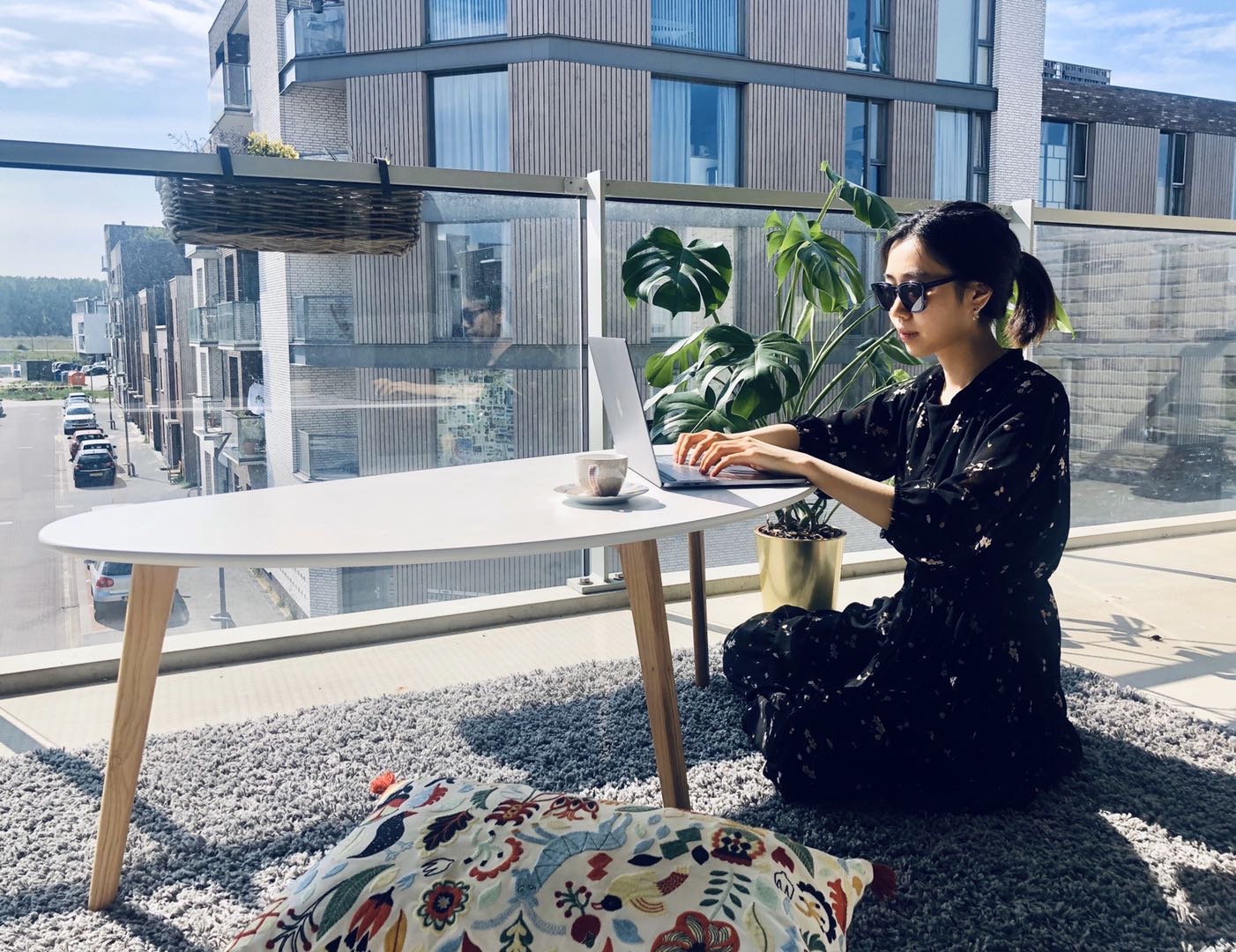Lan Wang is an EIT Digital Master School alumna from the Human-Computer Interaction and Design track, a Chinese-seasoned (born and raised) and Dutch-simmered (current country) digital design freelancer.
At the beginning of the year, she travelled back to her hometown, Enshi (in Hubei province, China), to celebrate Chinese New Year with her family without expecting to stay in locked-down Hubei for the next three months due to coronavirus outbreak.
When she flew back to Amsterdam in April, she strongly felt the difference between the two lands.
Three months in Hubei
Chinese New Year is the Christmas equivalent in Chinese culture, meant for family reunions. If one were to look at China from a bird’s eye view during the festival, one would see a massive domestic migration of crowds radiating from big coastal cities to the rest of China before the festival, and back to those first-tier cities afterwards - it is a shift between their working cities and hometowns.
On January 8th, Lan travelled back to Enshi to spend time with her family over Chinese New Year. While transiting through Wuhan, everything was normal in her eyes but for pieces of local news on a viral strain of influenza pneumonia.
On January 24th, the eve of Chinese New Year, the lockdown on Wuhan started - no residents could leave, only goods could be sent in. Soon, the lockdown policy applied to the whole Hubei province. As we all know later, the influenza pneumonia turned out to be the highly contagious coronavirus.
To Lan, “It was definitely a weird New Year. I’ve never imagined such a big thing could happen.” Many of her relatives who travelled home had to stay at their own homes. “Without meeting each other, a Chinese New Year can never be completed.”
The lockdown was implemented down to the residential-unit level. Each unit had its own access control checkpoint. Residents in the unit could only go out to shop for groceries every three days, while grocery stores were later able to deliver orders to the checkpoints.
“I never felt we lacked food or that grocery prices were rising,” Lan recalled. The Chinese government allocated each city in Hubei a province in the rest of China for 1-on-1 support of goods and medical resources. “We got Tianjin province, at some point we even received ‘Ma Hua’ (a traditional crispy snack, sort of a Pringles equivalent).”
Lan felt anxious when the lockdown started, worrying about when she could fly back to Amsterdam. The daily news had been filled with coronavirus updates, and she felt so stressed that she decided to disconnect from the news and focus on her freelance project to keep her sanity. After setting up a working routine from 9am to 5pm, she started feeling grounded.
After work, her parents kept ‘feeding' her. Lan’s Chinese stomach said it was happy. With dinners and TV nights with her parents, she found “a side-effect of the quarantine - I got the chance to spend more time with my parents.”
When the sun shone outside the windows, Lan realised how much she missed travelling. Every chance to take the rubbish out was a moment of outdoor happiness. In the three months of lockdown, she never left her residential unit.
Though the stay-at-home period was far from exciting, Lan admitted, “personally the lock-down was effective to combat the virus when I saw how the situation developed in Hubei afterwards.” The lockdown ended in mid-March for Enshi, and early April for Wuhan. Luckily, none of Lan’s family members or friends got infected.
People were still very cautious about physical contact after the lockdown. All the bubble tea stores had their doors half-opened, and customers could only scan a QR code on the door to self-checkout in the WeChat app. A few minutes later, a freshly made bubble tea would be handed over to the customer from a staff member behind the door, together with a receipt noting the name and body temperature measurement of the staff.
It was time for Lan to go back to the Netherlands. Along the way, in Pudong Airport (Shanghai), her Alipay Health Code (a real-time monitoring system that determines whether the bearer poses a contagion risk) was checked many times by airport staff in protective coveralls. Lan observed her 200+ seat plane filled by only about 30 passengers. In contrast, after landing at Schiphol Airport in Amsterdam, she found no airport staff wearing a face mask.
The global COVID-19 outbreak has proven the world is more connected than ever. Lan truly hopes we are allowed to travel freely so that friends and families can meet, and people are united to overcome the coronavirus.
The freelance life
Lan continued her life as a digital design freelancer, her third job after graduation.
Lan’s first job was as UX/UI designer with Bunq, a fintech startup. In that fast-paced startup, she quickly learnt effective communication and got to know many interesting young colleagues.
After one year at Bunq, Lan felt it was time for the next challenge. When Philips Lighting’ HR approached her and shared a job opening in Eindhoven, Lan applied, got interviewed, and received an offer to work at Philips Lighting. This was followed by two years in the design team of Philips Hue.
As part of the user experience team, Lan has worked on different digital touch-points for Philips Hue and also got chance to be responsible for the Hue PoS app throughout the production process: business stakeholder meetings, customer needs definition, development support, meeting clients in US and etc. Eventually, the Hue PoS app won an IF design award 2020.
The design experience at Philips Lighting gave Lan a higher platform and many learning opportunities. “I was in a team of more than 10 designers. We had lunch together every day, sharing our work and life experiences,“ Lan said, “though we are very different, we still find a lot in common and understand each other.”

(sheep outside office window and cat by working laptop)
Gradually, Lan felt more and more motivated to work for herself so she decided to become a digital design freelancer. “Though freelance life is more uncertain, I enjoy working on my own goals and the flexibility it offers”, Lan said.
As a freelancer, Lan carefully manages the freedom in her life. She thinks more deeply about her own growth and schedules more time for her higher priorities. The first several months were hard for her, as she had to learn to deal with various administrative affairs: company registration, tax declaration, contract signing, client negotiation, etc. Besides, she didn’t have many client contacts.
Since then, she has realised the importance of self-marketing. “Many people start taking small freelance projects as weekend hobbies when at school or working full-time aside. They accumulate contacts and make themselves visible, which are essential to be a freelancer,” she says. Now, she has delivered a few high-quality projects and established trust with her long-term clients.
“Human-Computer Interaction and Design alumni could do with more communication skills,” Lan said, “since we have various skills like UX/UI design, front-end development and business thinking, we could join more meetups and experience sharing!”
Recently Lan starts to understand more how uncertain and fragile life could be. “I need to have a work-life balance, go to different places, do things I always wanted to do, and focus on living for the moment” That is one of the things she learned from the 3-month quarantine.

(Lan works from her balcony when the sun is out)
Author: Jiayao Yu
Edit: Gaffar Rampage
